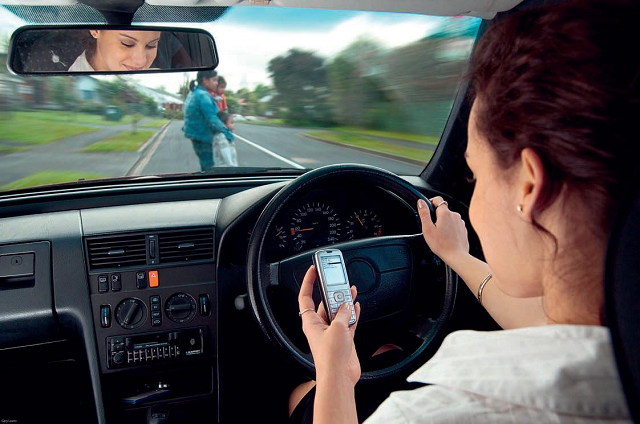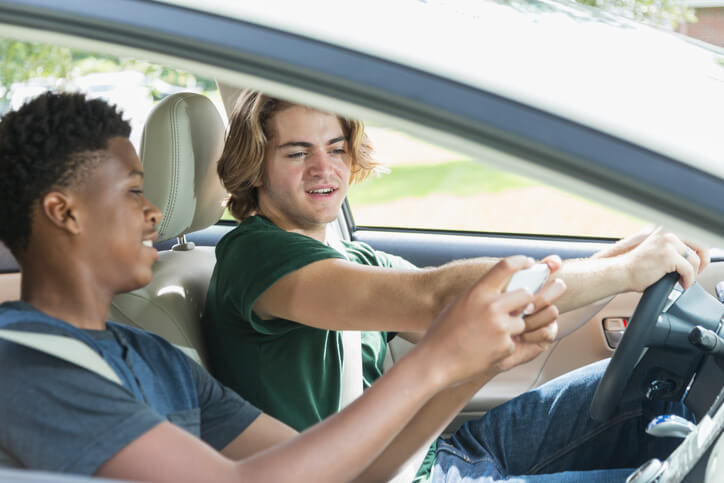
There are many teenage driving risks for every parent to know. For teenage drivers, the road can be a scary, scary place—and here’s why.
Driving, for anyone, is scary business. Statistically speaking, you’re likely to crash your car once every 18 years or so. Every day, you get behind the wheel of a heavy, powerful machine, buckle yourself in, and hope for the best. But what about the teens in your life who are doing the same?
Young people aged 15 to 24 represent just 14 percent of the US population, but they account for 30 percent of the total costs of injuries suffered in motor-vehicle crashes. With that in mind, and given that this week is Teen Driver Safety Week, we wanted to investigate five teenage driving dangers—and what, if anything, can be done to mitigate them.
Below is a list of teenage driving risks. Check them out:
Teenage Driving Risks
Scroll down for video
Texting and Other Distractions

Emaze
We’ll keep this one short, because we’ve covered it before—distracted driving is nothing short of a dangerous epidemic. In 2012 alone, 3,328 Americans were killed in distracted driving crashes. As many as 71 percent of teens and young people say they have composed or sent text messages while driving, according to the National Highway Traffic Security Administration. And 78 percent of teens and young adults say they’ve read one. There’s no other way to slice it: driving while distracted is putting your life at serious risk.
And teens, in particular, are easily driven to distraction. The science behind this is kind of cool: teens have too much gray matter or the cells that crunch information. The result? Chaos inside their growing minds and a tendency not to pay attention. Add to that the Pavlovian response we all have to the little ping, and it’s easy to see how teens could find themselves in trouble.

National Security Council
If teens are social creatures, then giving them a phone and the ability to text is like handing Kanye West the microphone—they just can’t resist. According to a study by the Pew Internet and America Life Project, more than 75 percent of today’s teens have a cell phone (up 45 percent from about ten years ago, by the way). About 88 percent of those users are texters, and one in three teens report sending more than 100 messages per day.
In other words: many, many teens send more than 3,000 texts each month. Teenagers are driven to social interaction as a means of self-definition and a way to separate from their family unit. Instead of asking mom and dad for guidance, they look to their peers. So when those peers are available day or night—or behind the wheel or not—the temptation can be immense.
Though different numbers are tossed around, a June survey from this year found that about 41 percent of America’s driving teens reported that they had texted or e-mailed while driving. (These, of course, are just the teens admitting to their bad habits.) Meanwhile, 56 percent of teens say they talk on the phone while driving, and not only can talking on a cell phone double the likelihood of an accident, it can slow a young driver’s reaction time down to that of a 70-year-old.\
Friends
This is also considered as one of many teenage driving risks. Another social problem presented to teenage drivers? Peer pressure. Less than half of teens (44 percent) said they would definitely speak up if someone were driving in a way that scared them.
Their Own Brains
You’ve heard it before, and turns out it’s true. Teenage brains really are wired differently. More specifically, their frontal lobes aren’t fully connected yet. This great NPR piece explains that the nerve cells that connect teenagers’ frontal lobes with the rest of their brains are sluggish because teens are still missing some of a fatty coating called myelin or “white matter.” Grown folks have plenty of myelin, which NPR explains is like insulation on an electric wire. It’s myelin that helps keep communication between parts of the brain running smooth as traffic on a Sunday morning. So when it’s absent? It’s a recipe for trouble.
More specifically, teens lack the insight that adults have about how their behaviors affect others around them. Teenagers don’t just seem surly and self-centered—their brains actually make them so. So whether that means ignoring the dangers of reckless or distracted driving or just plain not thinking about the consequences of backing out of a parking space, the cards are stacked against teens in their very makeup.
Drinking and Driving

Odyssey
Of all teenage driving risks, this one stands out the most. There is a small piece of good news: teens are not drinking and driving in the same numbers they were two decades ago. In fact, the number of high-school students aged 16 and above who self-reported driving drunk fell by 54 percent. Another 2012 Centers for Disease Control study found that in 2011, only 10.3 percent of high school students 16 and older reported drinking and driving in the previous 30 days, compared to 22.3 percent in 1991.
Speeding + Reckless driving
Though speeding hasn’t always attracted the same kind of attention as other teen driving behaviors, that doesn’t make it any less of an issue. In fact, speeding is becoming more of an issue, rather than less. In 2000, it accounted for 30 percent of fatal teen crashes; in 2011, 33 percent. Especially a problem for young males, speeding is involved in half of all fatal crashes involving 16-year-old drivers with three or more passengers.
But speeding is, of course, difficult to address, and a deep part of our culture. The Insurance Institute for Highway Safety does offer a few suggestions: state and local police should enforce all traffic laws, including using automated enforcement when necessary; parents should consider not buying teenage drivers a car immediately; and parents should choose newer and larger cars, in lieu of hot wheels.
There’s so much teenage driving risks an it’s a dangerous road out there—what do you do to keep the teens in your life safe?
Watch the video below